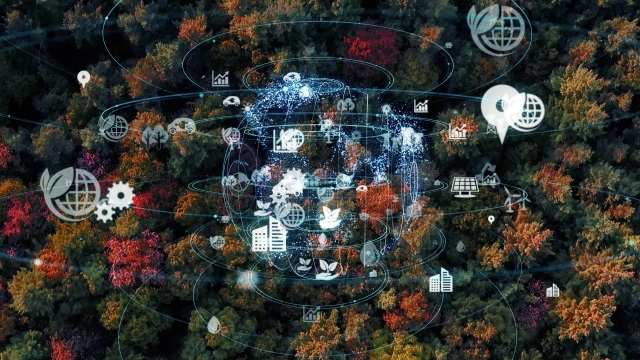
Five years ago, Pope Francis placed a special emphasis on the Church’s care and concern for planet Earth and the consequences of climate change with his encyclical Laudato Si. This concern is aligned with the Vincentian mission of St. John’s University, which hosted an online conference devoted to an in-depth discussion of this important document.
Held on March 26, the conference, “De Terris, Aquis et Aeribus: Laudato Si’ 5-Years on…,” was sponsored by the Institute for International Communication, which is housed in The Lesley H. and William L. Collins College of Professional Studies. Keynote speakers included His Eminence Cardinal Peter Kodwo Appiah Turkson, Prefect of the Dicastery for Promoting Integral Human Development; Satya S. Tripathi, Assistant Secretary General and Head of the New York Office of the United Nations Environment Programme; and Marco Mari, President of Green Building Council Italia.
Cardinal Turkson, who served as St. John’s 2017 Commencement speaker, said that from the outset of his pontificate, Pope Francis encouraged his flock to be caretakers of the poor and the environment.
“Climate is not the weather,” Cardinal Turkson stressed. “Weather is the atmospheric condition at a particular moment, but, over decades, patterns emerge that we can call climate. We are talking about 100 to 150 years, which goes beyond the lifespan of all of us.” Science allows us to discern these changes and recognize patterns, he explained.
“We are missing calls from Mother Earth and scientists who tell us that we are underestimating the enormous challenges of the warming world,” he continued. “These calls take many forms, and they have ways of hitting us very hard.” He gave examples such as an ice sheet breaking off from the Antarctic or Greenland, or record-breaking wildfires in California.
“If we open our eyes now, we can see a crisis right on our doorstep,” Cardinal Turkson stressed.
Mr. Tripathi noted that Pope Francis was interested in keeping and tilling the garden of the world. “That is where we have failed the Earth spectacularly as a human race. We have tilled it to death, but we have kept nothing.” He added that there has been much conversation around climate change, but little action. “I sincerely hope we stop talking and start acting.”
“In our arrogance, we believe Mother Nature exists for us or that we will save the planet,” Mr. Tripathi noted. “Mother Nature was here long before us and will be long after we are gone.” He added that nearly a million species are endangered of becoming extinct due to the actions of the human race, and there has been a dramatic increase across the globe in so-called “once in a hundred year” events.
Mr. Mari said that Pope Francis believed no one can save themselves, or the Earth, alone. “We must act together,” he stressed. Mr. Mari is President of GBC Italia, a nonprofit association dedicated to leading the entire building supply chain in the sustainable transformation of the built environment into a more resilient, sustainable, and healthy living space.
Believing no time can be wasted to combat climate change, Mr. Mari’s group is dedicated to designing cities that bring people into equilibrium with the environment. “We must act affirming the dignity of people in relation to the environment, use sustainable resources, and measure the impact on the environment,” he explained.
Venezuela native Juan Elias Chebly, Ph.D. ’09MBA, Strategic Partnerships Officer at the United Nations World Food Programme and a visiting Professor of Economics and Finance at St. John’s University, noted that the income inequality he witnessed growing up in Caracas was very stark. “My interests were always identifying the root causes of such discrepancies, and it was my faith that moved me into caring about these issues,” he observed.
It was thanks to St. John’s that Dr. Chebly came to grasp the concepts of integral human development. “The world of faith is intertwined with the work we do at the United Nations,” he said. “Human development is rooted in the same principles as Catholic social teaching: dignity, solidarity, subsidiarity.”
Dr. Chebly added, “Pope Francis was a massive help for me personally, as a devout Christian, to hear that my work as a lay person was also a part of the Universal Church and this brotherhood we call humankind.” Ultimately, he added, “it all boils down to loving our neighbor.”
Related News
TSOE Alumna Appointed Director of Curriculum in Amityville
Jessica Kemler ’99ED,’22Ed.D.—a double alumna of The School of Education at St. John’s University—began the new year as the new Director of Curriculum in the Amityville, NY, School District. “We are...
Alumna Celebrates Book Launch After Career Change
After developing a passion for helping the younger generation, Ashley Wilson ’14M.S.Ed. pivoted from a career in the music industry to work as an educator. She is also making her mark through her new...
Dean Jerrold Ross Conference Room Unveiled
On Tuesday, December 10, the newly renovated conference room on the fifth floor of Sullivan Hall was dedicated in honor of Jerrold Ross, Ph.D., former Dean of The School of Education . The renovation...
